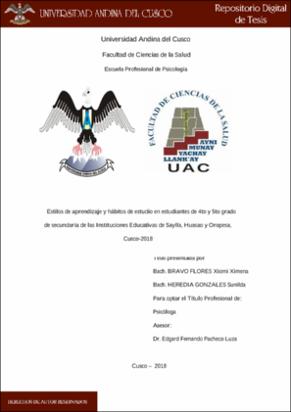| dc.contributor.advisor | Pacheco Luza, Edgard Fernando | |
| dc.contributor.author | Bravo Flores, Xiomi Ximena | |
| dc.contributor.author | Heredia Gonzales, Sunilda | |
| dc.date.accessioned | 2019-02-15T14:14:29Z | |
| dc.date.available | 2019-02-15T14:14:29Z | |
| dc.date.issued | 2018-11-15 | |
| dc.identifier.uri | https://hdl.handle.net/20.500.12557/2178 | |
| dc.description.abstract | El estudio tuvo como objetivo determinar la relación entre los estilos de aprendizaje y losb hábitos de estudio, se trabajó con una población de 287 estudiantes entre varones y mujeres. El diseño de la investigación fue no experimental transversal de tipo descriptivo correlacional. Para la recolección de datos se utilizó el Inventario de Estilos de aprendizaje de Kolb y el Inventario de Hábitos de estudio CAMS-85. El procesamiento de los resultados se realizó a través del Chi- Cuadrado de independencia y el coeficiente de contingencia. Los resultados de la investigación muestra 95% de confiabilidad que no existe relación entre los estilos de aprendizaje y hábitos de estudio, el estilo predominante es el estilo divergente, que se caracteriza por tener tendencia a desarrollar conceptualizaciones pragmáticas más que teóricas, prefieren el trabajo en grupo, son mejores al observar situaciones concretas desde diferentes perspectivas, en cuanto a las cinco dimensiones presenta una relación que es “preparación de exámenes” con los estilos de aprendizaje, por tanto en base a los estilos de aprendizaje de cada estudiante, van a prepararse de diferentes formas ante un examen utilizando diversas técnicas y estrategias de aprendizaje. | es_PE |
| dc.description.abstract | The objective of the study was to determine the relationship between learning styles and
study habits, working with a population of 287 students between men and women. The design of the research was non-experimental cross-sectional descriptive type correlational. For the data collection, the kolb Learning Styles Inventory and the CAMS-85 Study Habits Inventory were used. The processing of the results was done through the Chi-square of independence and the contingency coefficient. The results of the research show 95% reliability that there is no relationship between learning styles and study habits, the predominant style is the divergent style, which is characterized by having a tendency to develop pragmatic rather than theoretical conceptualizations, prefer work as a group, they are better at observing concrete situations from different perspectives, in terms of the five dimensions they present a relationship that is “exam preparation“ with learning styles, therefore based on the learning styles of each student, they will Prepare in different ways before an exam using different learning strategies and techniques. | en_US |
| dc.description.uri | Tesis | es_PE |
| dc.format | application/pdf | es_PE |
| dc.language.iso | spa | es_PE |
| dc.publisher | Universidad Andina del Cusco | es_PE |
| dc.rights | info:eu-repo/semantics/restrictedAccess | es_PE |
| dc.source | Universidad Andina del Cusco | es_PE |
| dc.source | Repositorio Institucional - UAC | es_PE |
| dc.subject | Hábitos de estudio | es_PE |
| dc.subject | Estilos de aprendizaje | es_PE |
| dc.subject | Estudiantes--Secundaria | es_PE |
| dc.title | Estilos de aprendizaje y hábitos de estudio en estudiantes de 4to y 5to grado de secundaria de las Instituciones Educativas de Saylla, Huasao y Oropesa, Cusco-2018. | es_PE |
| dc.type | info:eu-repo/semantics/bachelorThesis | es_PE |
| thesis.degree.name | Psicóloga | es_PE |
| thesis.degree.grantor | Universidad Andina del Cusco. Facultad de Ciencias de la Salud | es_PE |
| thesis.degree.level | Titulo Profesional | es_PE |
| thesis.degree.discipline | Psicología | es_PE |

